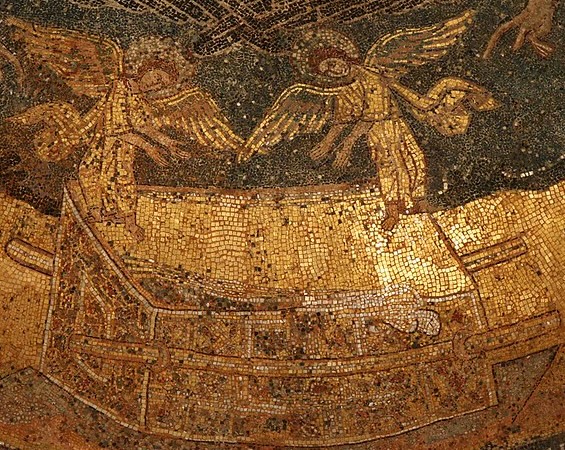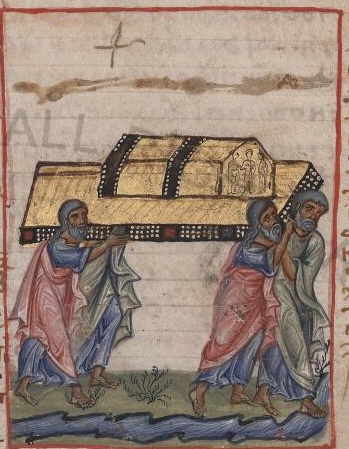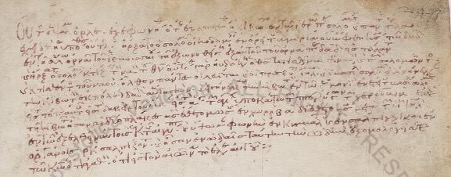
Two Unpublished Byzantine Scholia on Psalms 104 and 135 and the Ark of the Covenant
Maria Tomadaki
August 30, 2024
Manuscript Ra 271 is a Psalter Catena from the eleventh-century, which is distinguished for its elegant script and its variety of exegetical scholia on the Psalms.[i] Among the numerous scholia, authored by both renowned and anonymous writers, two unpublished commentaries on Psalms 104 and 135 stand out.[ii] These particular scholia, written in red ink, were added to the manuscript by a later hand, possibly by a scribe from the fourteenth century. These texts, known as hypotheseis, are brief summaries that refer to the subject-matter of each Psalm (Ps. 104, Ps. 135) and connect them to the Ark of the Covenant.[iii] The Ark was one of the most important sacred objects of the Israelites, which contained the tablets of the Ten Commandments. Although it has been lost, the Holy Scriptures provide detailed descriptions: it is depicted as being plated with pure gold and having on the top two cherubim stretching their wings.

The Ark of the Covenant, Apse Mosaic (c. 805 AD),
Byzantine artist, Germigny-des-Prés, France © Holly Hayes
The first exegetical passage is placed on f. 182v and informs the reader that Psalm 104 was sung when David and the Israelites placed the Ark in David’s tent. The information draws from 1 Chronicles 16, where part of the same Psalm is quoted, albeit with different wording.[iv]
Ταύτην τὴν ᾠδὴν εἶπoν οἱ ψαλτῳδοὶ αἴροντες τὴν κιβωτόν, ὅτε κατέπαυσεν ταύτην ὁ βασιλεὺς Δαυὶδ καὶ ἅπας Ἰσραήλ. Ἀπέθηκαν αὐτὴν εἰς τὴν σκηνὴν ἣν ἔκτισεν ὁ Δαυὶδ ὑποστρεφομένης ἀπὸ τῆς αἰχμαλωσίας· οὕτως γὰρ εὑρίσκεται γραφὲν[v] ἐν τῷ πρώτῳ[vi] τῶν Παραλειπομένων καὶ ἔταξε Δαυὶδ ἐν ἀρχῇ τοῦ αἰνεῖν τὸν κύριον ἐν χειρὶ Ἀσὰφ καὶ τῶν ἀδελφῶν[vii] αὐτοῦ τὴν ᾠδὴν ταύτην, ἥτις τὸν ρδ´ψαλμόν.
The psalmists sang this song while carrying the Ark, when King David and all Israel laid it to rest. They placed it in the tent that David had made when it returned from captivity. So, it is written in the first book of Chronicles that David initially ordained this song for praising the Lord by the hand of Asaph and his brothers, the song of Psalm 104.

The Ark of the Covenant, Vat. gr. 746 (10th c.), f. 443r, © Biblioteca Apostolica Vaticana
The same hand added another longer scholium in red ink on f. 243r, which specifies the context in which Psalm 135 was sung. This scholium combines and paraphrases excerpts from 2 Chronicles 3–5 in Byzantine Greek. It particularly links Psalm 135 with Solomon and the ritual of the Ark’s placement into the Temple.
Οὗτος ὁ ψαλμός, ὁ ρλε´, ἐξεφωνήθη ὅτε ἐναπετέθη ἡ κιβωτὸς ἐν τῷ ἱερῷ παρὰ Σολομῶντος καὶ παντὸς τοῦ λαοῦ, ἔχει δὲ ἡ ὑπόθεσις οὕτως· ἤρξατο ὁ Σολομὼν οἰκοδομεῖν ἐν ὄρει τοῦ Ἀμωρία, οὗ ὤφθη κύριος τῷ Δαυὶδ ἐν τῇ ἅλῳ Ὀρνᾶ[viii] τοῦ Ἰεβουσαίου,[ix] τῇ ἐξωνηθείσῃ ἐξ αὐτοῦ τοῦ Ὀρνᾶ παρὰ Δαυὶδ εἰς τάλαντα. Καὶ ἤρξατο ὁ Σολομὼν κτίζειν τὸν ναὸν τοῦ Θεοῦ αὐτόθι γὰρ ηὐδόκησε ὁ Θεὸς κτισθεῖναι τὸν ναὸν καὶ παρὰ Σολομῶντος, καὶ κτισθέντος τοῦ ναοῦ ἦλθον πάντες οἱ Λευῖται καὶ οἱ πρεσβύτεροι Ἰσραὴλ καὶ ὁ βασιλεὺς Σολομὼν καὶ ἀνήνεγκαν τὴν κιβωτὸν ἐκ πόλεως Δαυὶδ αὕτη Σιὼν καὶ εἰσήνεγκαν τὴν κιβωτὸν ἐν τῷ ζ΄ μηνί, ἐν ἔτει τοῦ βασιλέως Σολομῶντος εἰς τὸν τόπον αὐτῆς, εἰς τὸν δαβὶρ[x] τοῦ οἴκου, εἰς τὰ ἅγια τῶν ἁγίων, ὑποκάτω τῶν πτερύγων τῶν Χερουβίμ. Ἐν τῇ κιβωτῷ ἦσαν αἱ δύο πλάκες, ἃς ἔθετο Mωυσῆς ἐν Χωρήβ, ἃ διέθετο κύριος μετὰ τῶν υἱῶν Ἰσραὴλ ἐν τῷ ἐξελθεῖν αὐτοὺς ἐκ τῆς Αἰγύπτου.[xi] Καὶ ὕψωσαν φωνὴν ἐν κυμβάλοις καὶ ἐν σάλπιγξι καὶ ἐν ὀργάνοις ρκ´ σαλπίζοντες καὶ ἦσαν ἐν ᾠδαῖς ταύτην τὴν ᾠδὴν “ἐξομολογεῖσθε τῷ Κυρίῳ ὅτι ἀγαθός, ὅτι εἰς τὸν αἰῶνα τὸ ἔλεος αὐτοῦ”.[xii]
This Psalm 135 was recited when the Ark was placed in the Temple by Solomon and all the people, its hypothesis is as follows: Solomon began building <the Temple> on the mountain of Amoria, where the Lord appeared to David on the threshing floor of Ornan the Jebusite, which was bought by Ornan from David with talents. And Solomon began building the Temple of God, for God was pleased that the temple was built there and by Solomon. And after the temple was built all the Levites came and the elders of Israel and King Solomon and brought the Ark from Zion, the city of David, and brought it in the seventh month of the year of King Solomon into its place, in the shrine of the house, in the Holy of Holies under the wings of the cherubim. Two tablets were in the Ark, which Moyses placed in Horeb, where the Lord made a covenant with the sons of Israel when they came out of Egypt. And they raised their voice with cymbals and trumpets and with 120 instruments sounding and this song was among the songs: “Acknowledge the Lord, because he is good, because his mercy is forever”.

Ra 271, f. 243r, detail © Biblioteca Apostolica Vaticana
The anonymous Byzantine exegete was well trained in Holy Scriptures, relating in a clever way Psalm 135 to the second Book of Chronicles. The quoted text “ἐξομολογεῖσθε τῷ Κυρίῳ ὅτι ἀγαθός, ὅτι εἰς τὸν αἰῶνα τὸ ἔλεος αὐτοῦ” is indeed the beginning of Psalm 135 in Ra 271, and is also found in 2 Chronicles 5:13.[xiii] It is worth noting that the Göttingen editions, use χρηστός instead of ἀγαθός in Psalm 135:1 and ἀγαθόν in 2 Chronicles 5:13.[xiv] In the first case a synonym is used, whereas the word ἀγαθόν in the Book of Chronicles changes the meaning of the verse as follows “it is good to acknowledge the Lord, because his mercy is forever”.
These Byzantine exegetical scholia, which may seem insignificant at first glance, highlight a crucial task: the examination of psalm verses quoted in the historical books of the Septuagint. It is essential to determine whether these verses depend on the Septuagint Psalms or were independently translated from the Hebrew. In the former case, such quotations – like those from the Psalms found in the New Testament – serve as important indirect witnesses to the Greek Psalter, particularly given their early origin. This very question was recently addressed by Gert J. Steyn.[xv] Steyn convincingly argued that the Greek translator of 1 Chronicles was unaware of the Septuagint Psalms and did not recognize the psalm quotations in his Hebrew Vorlage. As a result, he translated 1 Chronicles independently of the LXX Psalms.
[i] I am very grateful to Dr. Felix Albrecht for his valuable comments, corrections and his bibliographical support.
[ii] For its Psalter catena, see G. Dorival, Les chaînes exégétiques grecques sur les Psaumes: contribution à l'étude d'une forme littéraire, III, Leuven 1992, 440–492 and M. Tomadaki, “The Catena Type XIV on the Psalms (CPG C27) and its Christological Aspects”, in U. Heil & S. Panteghini (eds.), Catenae as Databases, the Challenge of Using, Interpreting and Editing Catenae Manuscripts (Manuscripta Biblica), De Gruyter (forthcoming). For its hexaplaric readings see F. Albrecht, “Report on the Göttingen Septuagint”, Textus (2020), 201–220, 217–220.
[iii] Cf. the hypotheseis (short summaries), which precede the ancient dramas in the Byzantine manuscripts. For an example of a Byzantine hypothesis on Sophocles’ Electra see Μ. Τomadaki – E. Μ. van Opstall, “Τhe Tragedians from a Byzantine Perspective: Book Epigrams on Aeschylus, Sophocles and Euripides”, Medioevo greco 19 (2019) 207.
[iv] The similarities are particularly evident between 1 Chronicles 16:8–22 and Psalm 104:1–15.
[v] γράφων cod.
[vi] τῇ πρώτῃ ante correctionem.
[vii] Cf. 1 Chronicles 16:7, ed. A. Rahlfs – R. Hanhart, Septuaginta, Editio altera, Stuttgart 2006, vol. I, 787.
[viii] In other Byzantine texts the name occurs as Ὀρνά.
[ix] Ἰεβουσσαίου cod.
[x] Δαβείρ cod.
[xi] This sentence reproduces 2 Chronicles 5:10, ed. R. Hanhart, Paralipomenon liber II, Göttingen 2014, 152–153.
[xii] For the text into quotation marks see 2 Chronicles 5:13, ed. R. Hanhart, Paralipomenon liber II, Göttingen 2014, 154.
[xiii] The same verse occurs in Ps 117:1, ed. A: Rahlfs, Psalmi cum Odis, Göttingen 1931, 285.
[xiv] Ps 135:1, ed. A: Rahlfs, Psalmi cum Odis, Göttingen 1931, 317; 2 Chronicles 5:13, ed. R. Hanhart, Paralipomenon liber II, Göttingen 2014, 154.
[xv] Gert J. Steyn, “LXX Psalm 104 and Its Relation to the Greek Translation of 1 Chronicles 16,” presented on July 30, 2024, at the International Society of Biblical Literature (ISBL) 2024 Conference, Amsterdam, Netherlands, July 28–August 1, 2024. See also P.C. Beentjes, “Psalms and Prayers in the Book of Chronicles,” in E. Peels and B. Becking (eds.), Psalms and Prayers: Papers Read at the Joint Meeting of the Society for Old Testament Study and Het Oud Testamentisch Werkgezelschap in Nederland en België, Apeldoorn, August 2006 (Old Testament Studies 55), Leiden 2007, 9–44. Beentjes analyzes the Psalms quotations in Chronicles, highlighting that many of them originate from the Chronicler’s “Sondergut” rather than from Samuel and Kings. See also A. Berlin, “Psalms in the Book of Chronicles,” in M. Bar-Asher et al. (eds.), Shai le-Sarah Japhet: Studies in the Bible, Its Exegesis, and Its Language, Jerusalem 2007, 21–36.
by Jonathan Groß and Peter Schreiner, January 20, 2026
by Bonifatia Gesche, December 23, 2025
by Matteo Domenico Varca, November 30, 2025
by Anna Kharanauli, October 31, 2025
by Jonathan Groß, September 26, 2025
by Felix Albrecht, August 31, 2025
by Vadim Wittkowsky, July 31, 2025